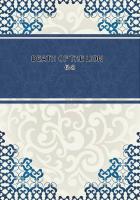The second Charles owed an old debt to Penn's father. He paid it in 1681 by giving to the son, whom he liked, a province in America. Little by little, in order to gain for Penn access to the sea, the terms of his grant were widened until it included, beside the huge Pennsylvanian region, the tract that is now Delaware, which was then claimed by Baltimore. Maryland protested against the grant to Penn, as Virginia had protested against the grant to Baltimore--and equally in vain. England was early set upon the road to many colonies in America, destined later to become many States. One by one they were carved out of the first great unity.
In 1685 the tolerant Charles the Second died. James the Second, a Catholic, ruled England for about three years, and then fled before the Revolution of 1688. William and Mary, sovereigns of a Protestant England, came to the throne. We have seen that the Proprietary of Maryland and his numerous kinsmen and personal adherents were Catholics. Approximately one in eight of other Marylanders were fellows in that faith. Another eighth of the people held with the Church of England. The rest, the mass of the folk, were dissenters from that Church. And now all the Protestant elements together--the Quakers ex excepted solidified into political and religious opposition to the Proprietary's rule. Baltimore, still in England, had immediately, upon the accession of William and Mary, dispatched orders to the Maryland Council to proclaim them King and Queen. But his messenger died at sea, and there was delay in sending another. In Maryland the Council would not proclaim the new sovereigns without instructions, and it was even rumored that Catholic Maryland meant to withstand the new order.
In effect the old days were over. The Protestants, Churchmen and Dissenters alike, proceeded to organize under a new leader, one John Coode. They formed "An Association in arms for the defense of the Protestant religion, and for asserting the right of King William and Queen Mary to the Province of Maryland and all the English Dominions." Now followed a confused time of accusations and counter-accusations, with assertions that Maryland Catholics were conspiring with the Indians to perpetrate a new St.
Bartholomew massacre of Protestants, and hot counter-assertions that this is "a sleveless fear and imagination fomented by the artifice of some ill-minded persons." In the end Coode assembled a force of something less than a thousand men and marched against St. Mary's. The Council, which had gathered there, surrendered, and the Association for the Defense found itself in power. It proceeded to call a convention and to memorialize the King and Queen, who in the end approved its course. Maryland passed under the immediate government of the Crown. Lord Baltimore might still receive quit-rents and customs, but his governmental rights were absorbed into the monarchy. Sir Lionel Copley came out as Royal Governor, and a new order began in Maryland.
The heyday of Catholic ******* was past. England would have a Protestant America. Episcopalians were greatly in the minority, but their Church now became dominant over both Catholic and Dissenter, and where the freethinker raised his head he was smitten down. Catholic and Dissenter and all alike were taxed to keep stable the Established Church. The old tolerance, such as it was, was over. Maryland paced even with the rest of the world.
Presently the old capital of St. Mary's was abandoned. The government removed to the banks of the Severn, to Providence--soon, when Anne should be Queen, to be renamed Annapolis. In vain the inhabitants of St. Mary's remonstrated. The center of political gravity in Maryland had shifted.
The third Lord Baltimore died in 1715. His son Benedict, fourth lord, turned from the Catholic Church and became a member of the Church of England. Dying presently, he left a young son, Charles, fifth Lord Baltimore, to be brought up in the fold of the Established Church.
Reconciled now to the dominant creed, with a Maryland where Catholics were heavily penalized, Baltimore resumed the government under favor of the Crown. But it was a government with a difference. In Maryland, as everywhere, the people were beginning to hold the reins. Not again the old lord and the old underling! For years to come the lords would say that they governed, but strong life arose beneath, around, and above their governing.
Maryland had by 1715 within her bounds more than forty thousand white men and nearly ten thousand black men. She still planted and shipped tobacco, but presently found how well she might raise wheat, and that it, too, was valuable to send away in exchange for all kinds of manufactured things.
Thus Maryland began to be a land of wheat still more than a land of tobacco.
For the rest, conditions of life in Maryland paralleled pretty closely those in Virginia. Maryland was almost wholly rural; her plantations and farms were reached with difficulty by roads hardly more than bridle-paths, or with ease by sailboat and rowboat along the innumerable waterways.
Though here and there manors--large, easygoing, patriarchal places, with vague, feudal ways and customs--were to be found, the moderate sized plantation was the rule. Here stood, in sight usually of blue water, the planter's dwelling of brick or wood. Around it grew up the typical outhouses, household offices, and storerooms; farther away yet clustered the cabin quarters alike of slaves and indentured labor. Then stretched the fields of corn and wheat, the fields of tobacco. Here, at river or bay side, was the home wharf or landing. Here the tobacco was rolled in casks; here rattled the anchor of the ship that was to take it to England and bring in return a thousand and one manufactured articles. There were no factories in Maryland or Virginia. Yet artisans were found among the plantation laborers--"carpenters, coopers, sawyers, blacksmiths, tanners, curriers, shoemakers, spinners, weavers, and knitters." Throughout the colonies, as in every new country, men and women, besides being agriculturists, produced homemade much that men, women, and children needed. But many other articles and all luxuries came in the ships from overseas, and the harvest of the fields paid the account.















